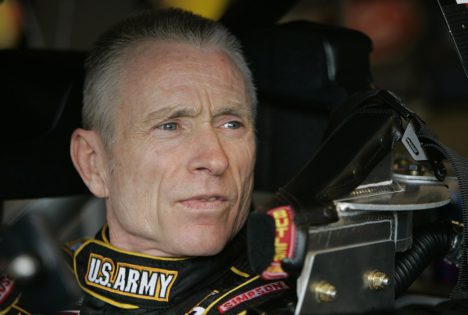Last weekend’s Xfinity race at Martinsville provided plenty of talking points. The biggest was the controversial finish that Austin Hill survived to triumph in the race. Of course, many NASCAR Cup drivers and veterans did not appreciate what went down in those last couple of laps. “Absolute garbage” is what the Martinsville Cup race winner, Denny Hamlin, called it on X. Among other disgruntled veterans was NASCAR legend Mark Martin, who was not pleased with the quality of racing on display.
In a nutshell, Sammy Smith was the trigger when his little grudge match with Taylor Gray went too far. The two drivers went hammer and tongs into the last lap as Smith shoved Gray out of the lead and wrecked himself and the field behind him by doing so. Later on, NASCAR punished Smith with a $25,000 fine and a 50-point deduction. However, many in the NASCAR community thought that the punishment came too late and that it should have been instantaneous.
Speaking on The Door Bumper Clear podcast, Mark Martin highlighted what he and many others believe is the primary culprit. According to him, it isn’t the drivers who are at fault, but a system that NASCAR has put in place.
Mark Martin feels a loss of integrity
Frankly, the NASCAR Playoff system has long been a divisive subject in the community, owing to its unpredictability. To sum up, the Playoff system pits drivers in an elimination format until 4 drivers are in contention at the finale. To qualify, drivers have to win at least one race during the regular season, and there is a 16-driver limit. This makes each race have increased stakes as one lucky break could give you a shot at potentially competing for a championship, and Matin feels the integrity of the sport is lost in that.
Mark Martin told Door Bumper Clear, “I personally don’t like the whole point system. I don’t like it, I think it should be full season, and I think there’s some tweaks to the old classic points system that could be made. For me, a champion is much more legitimate if he consistently runs well all year long. I think that there’s another way to put emphasis on winning. If you win a race, you should be celebrated by everyone in the sport as a bad—, period… Winning a race shouldn’t be a ticket to the championship… Would it be as entertaining? I don’t know. I just think that the integrity of the sport is more important than entertainment, and if you lose some viewers over that, then you lose some viewers!”
The criticism toward the playoff system hit the roof last season when Joey Logano won the Cup Series Championship with an average finish of 17, the lowest in Cup history. Meanwhile, Hendrick Motorsports’ Kyle Larson, who won six races, could not compete for a championship due to a below-average playoff run. This put the ‘win-and-you ‘re-in’ format under the spotlight as Logano’s win that took him to the playoffs was a quintuple overtime win at Nashville, which is another concept Martin isn’t a fan of.
Mark Martin declared, “First of all, playoffs we don’t play. They shouldn’t be called playoffs in my opinion, number one. Number two, overtime. You should call it something else, I don’t know. We’re not ball sports, but ball sports people that flip over and watch the end of the Martinsville Xfinity race? They’ll keep watching because they want to see that. But the classic race fan might turn that off. That’s where we’re at right now. The sport is catering to the non-race fan to click on TV and stay on because we got these gimmicks.”
The unpredictability of the playoffs is what brings more eyes to the product, and Martin feels that this is what is driving classic fans away from the sport. Gone are the days where Alan Kulwicki could win a championship on points by finishing 2nd in the last race and leading one lap more than the leader, Bill Elliott, for the title.
Finishing second no longer holds any value unless you can consistently finish there for the entire season, and even then, if 16 other drivers manage to win a race, say goodbye to your ticket to the playoffs. This is what entices drivers to wreck in search of the win; consistency holds less value, and Martin feels like casual fans will eat it up, while NASCAR has “abandoned [classic fans] with where we’ve taken the sport.”
The root cause of this playoff discussion remains the reckless driving at Martinsville last Saturday, and NASCAR has decided to take matters into its own hands before Darlington is upon us.
NASCAR VP calls for a meeting
“My blood was boiling,” said Christopher Bell after the Cup Series race on Sunday when asked about his thoughts on the Xfinity race that took place the night prior. From Cup Series stars to veterans of the sport, no one could stomach what went on at the Paperclip. Seeing this vehement reaction, senior Vice President of competition at NASCAR, Elton Sawyer, has taken matters into his own hands.
Appearing on SiriusXM NASCAR radio, Sawyer said, “There was a multitude of bad decisions that was made by a multitude of drivers throughout that event, and we plan to address that with the garage this weekend at Darlington.” With 14 cautions, over 100 caution laps, and a multi-car crash to end a short-track race, it’s not surprising that Sawyer has resorted to collectively giving the grid some advice. When asked what he would say to these drivers, Sawyer emphasized the importance of drawing a line.
Sawyer continued, “NASCAR racing, we’ve been built on, pushing and shoving is fine, tire marks are fine and that’s OK. It’s a contact sport. We totally get that. But we do have to step in from time to time when they cross the line, and we just want to let them know that this is crossing the line and we will step in.” A little bump and run to take the lead is part of the nature of the sport. As long as you don’t wreck the other guy, it is fair game, and Martinsville was far from a fair game. The driver in 6th entering the final turn (Astin Hill) ended up winning the race!
It is encouraging to see NASCAR take responsibility for the actions in the Xfinity Series and address the drivers ahead of their next race. Darlington is a bit longer than Martinsville at 1.3 miles, with more progressive banking, making it a tricky track to tackle, and we would certainly not want to see any egregious actions at another storied racetrack. So, what do you think? Will NASCAR solve the Xfinity mentality, or will chaos prevail at Darlington? Let us know in the comments!
The post Mark Martin Publicly Blasts NASCAR’s ‘Win & You’re In’ Rule as He Rips Into Modern Era’s Racing Gimmicks appeared first on EssentiallySports.



